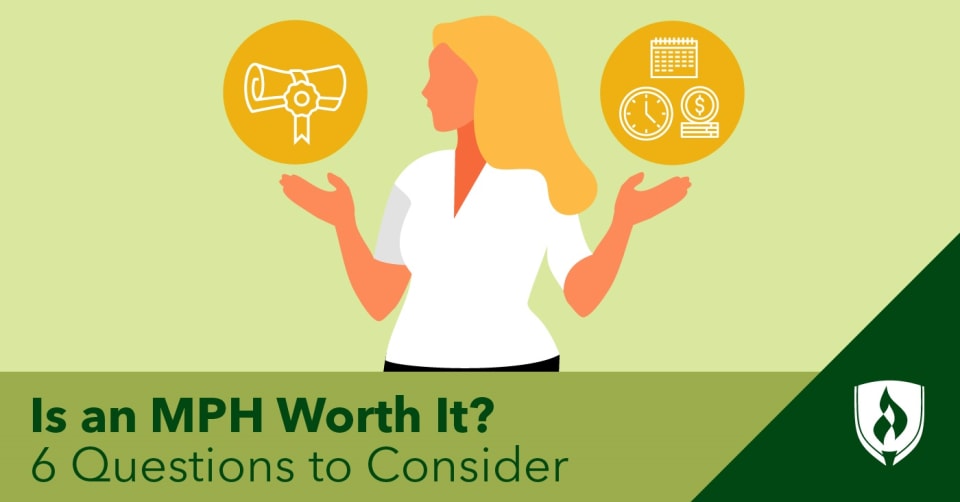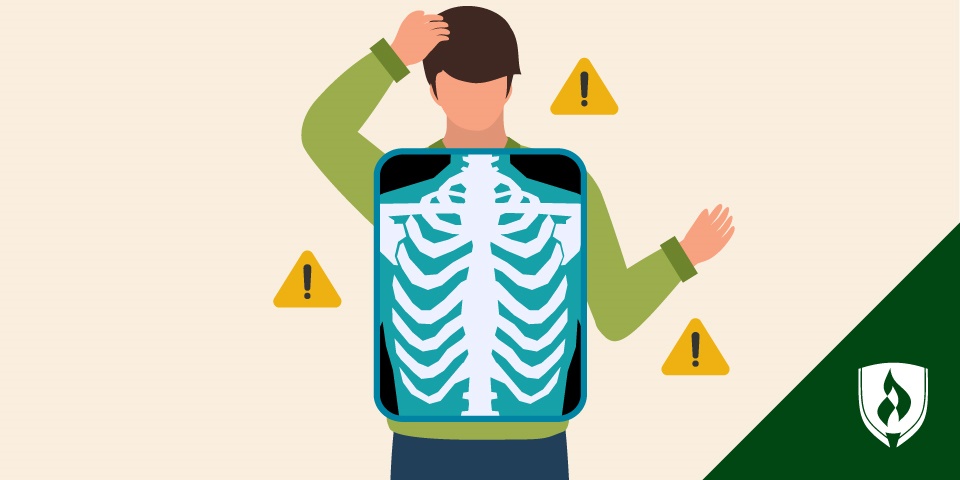
You’re no stranger to the world of healthcare. You know without a doubt that this is the right field for you. Lately, though, you’ve been feeling the itch to make a change in your career, possibly even taking it in a different direction from the healthcare work you’ve focused on in the past.
Earning a Master of Public Health (MPH) degree is one option you’ve been considering for a while now. You know it could potentially open up new career opportunities, but is an MPH worth the time, effort and expense? How can you know if it’s the right move for you?
Of course, there’s no universal way to answer this question. The answer to what makes an MPH degree “worth it” will be different for every individual. Much of it will depend on your career goals and what you want your future in healthcare to look like, but there are also important personal considerations you’ll want to keep in mind. As you consider whether to pursue earning an MPH, it can help to ask yourself these six questions before taking the leap.
Is an MPH worth it? Questions to consider
Reflecting on these topics will help you confidently take the next step in your healthcare career—no matter what your answer may be.
1. Why do I want to pursue an MPH degree?
You shouldn’t earn a degree just for the sake of feeling like you’re taking action to help advance your career. Earning an MPH requires an investment of time and money just like any other higher education, so it’s important to know what you hope to gain—and what’s motivating you to do so.
“It is imperative that you understand your ‘Why?’” says Dr. Joyvina Evans, professor of Public Health at Rasmussen University. “Graduate school is much different from undergraduate, and there are greater expectations. Keep your ‘Why?’ at the forefront.”
Try making a list of what you could do with an MPH that you couldn’t do without it. Think about if you feel a personal connection to the public health field and what you hope to accomplish there. Consider if you’ve always wanted to move forward with graduate school or if you’re only thinking about it because you feel stuck. If you can’t articulate why you want to pursue an MPH in one or two sentences, you may not be ready to enroll just yet.
2. What are my career goals?
Think about your favorite aspects of healthcare and make sure they fit with an MPH career path before committing to a program. Dr. Evans shares that MPH-degree holders have opportunities to work in a variety of areas, such as research, community health, health departments, education and nutrition.
“The possibilities are extraordinary,” Dr. Evans explains.
Some job titles that may be available with an MPH degree include:
- Public health educator
- Epidemiologist
- Clinical research coordinator
- Clinical trials researcher
- Hospital administrator
If these careers sound appealing, then an MPH degree could be the right move for you! There’s no doubt that an MPH degree can be quite versatile, with opportunities related to administration, education and clinical research.
However, you may have noticed that many of these positions aren’t heavy on patient interaction. If your favorite part of healthcare is patient-facing work, you may need to rethink if an MPH degree is the best option for achieving your goals.
3. Can I afford it?
It’s important to consider finances before rushing into an education program. Will you have to take out a loan to cover the cost? Is your employer willing to help with tuition reimbursement or other education benefits? Perhaps an MPH degree is in your future, but you need to spend time saving up money before you enroll.
You should also compare pricing in different MPH degree programs. Most people think of graduate school as being wildly expensive, but some programs are designed to be affordable.
For instance, the Master of Public Health program at Rasmussen University was developed to have a total program cost of less than $15,000.1 If cost is a key consideration for you, be sure to do your research about programs that are affordable without sacrificing quality.
Another affordability factor to consider is the flexibility and overall demands of the MPH program. Will you need to attend courses in person? Scale back work hours to accommodate the course workload? This is all worth thinking through—but know that a flexible program can help you make it all work.
4. How will it fit into my schedule?
Think about how the scheduling of your potential degree program is arranged. Some people prefer to dive into graduate school full time while others would rather take things slower. You’ll need to think about factors like how soon you want to complete your MPH degree, how much time you’re willing to sacrifice with family and whether or not you want to be able to keep your current job while going to school.
There’s no right or wrong answer to these questions, but they can guide you in determining if an MPH degree is really the best choice for you—and if it is, which type of degree programs to be on the lookout for.
For example, if flexibility is important to you, look for a program that offers online courses. If you aren’t willing to spend more than two years on an advanced degree, find a program that can help you achieve that completion goal, such as Rasmussen University’s MPH program that can be completed in as few as 21 months.2
5. Do I enjoy research and data analysis?
Not all MPH careers are heavy on research and analysis, but for many roles, they’re a key component of the job. Depending on your work and education background, this may be a significant step outside of your comfort zone. While there are certainly public health-focused roles that are less data analysis- and research-intensive, your options may be limited.
That said, it’s rare for someone to love every last bit of what they do for their work—and public health is no exception. “If you go into clinical research, you may have to deal with bodily fluids, like blood or urine, and understand how to store and ship lab specimens correctly,” Dr. Evans says. “If you accept a position on the data side of public health, you will have to deal with statistics and understand statistical software.”
This is why it’s so important to have a focused career goal before pursing an MPH. It allows you to determine if skill sets like research or data analysis will be components of your future career. If you’re not interested in those types of job duties, you can pivot your plans.
6. Is it the right time in my career?
Not every time is right for earning a graduate degree. If you’ve only been working in healthcare for a year or two, you may be better served by gaining more experience first. At a minimum, MPH graduates with limited experience should calibrate their expectations. For example, an MPH degree is unlikely to automatically catapult you into a high-level hospital administration position if you don’t already have years of relevant experience working in a hospital setting.
It may be beneficial to first look for ways to grow your skills without a graduate degree, such as gaining certification in your field or specialty. If your current career doesn’t feel like a good fit, apply for similar jobs in other departments or work environments before assuming that it’s time to get an MPH degree.
On the other hand, your career may have hit a plateau, with few advanced positions available to you due to education requirements. If you fit the bill for every job posting you see except the degree requirement, then the timing could be right for you to take the next step and enroll in an MPH program.
Is an MPH part of your future?
There’s no straightforward answer to questions like “Is an MPH worth it?” Now that you’ve had the opportunity to think about what an MPH would mean for you and your career, you’ve hopefully been able to determine that answer for yourself.
Want to learn more about what you can expect to find in an MPH program? Check out the Rasmussen University Master of Public Health online degree program to learn more about getting started.
Related Articles:
1Tuition for MPH program is $205 per credit. Students must maintain continuous enrollment to remain eligible for the tuition pricing of $205 per credit. A student who withdraws and re-enrolls will be required to pay the tuition price offered at the time of their re-enrollment. If a student needs to retake one or more courses in the degree program, the total cost of the program will exceed $15,000. MPH program cost breakdown: $11,480 in tuition + $2,870 in fees = $14,350 in program cost. Program availability varies by campus and state; please see the Rasmussen University Catalog for details
2Completion time is dependent on transfer credits accepted and the number of courses completed each term.




